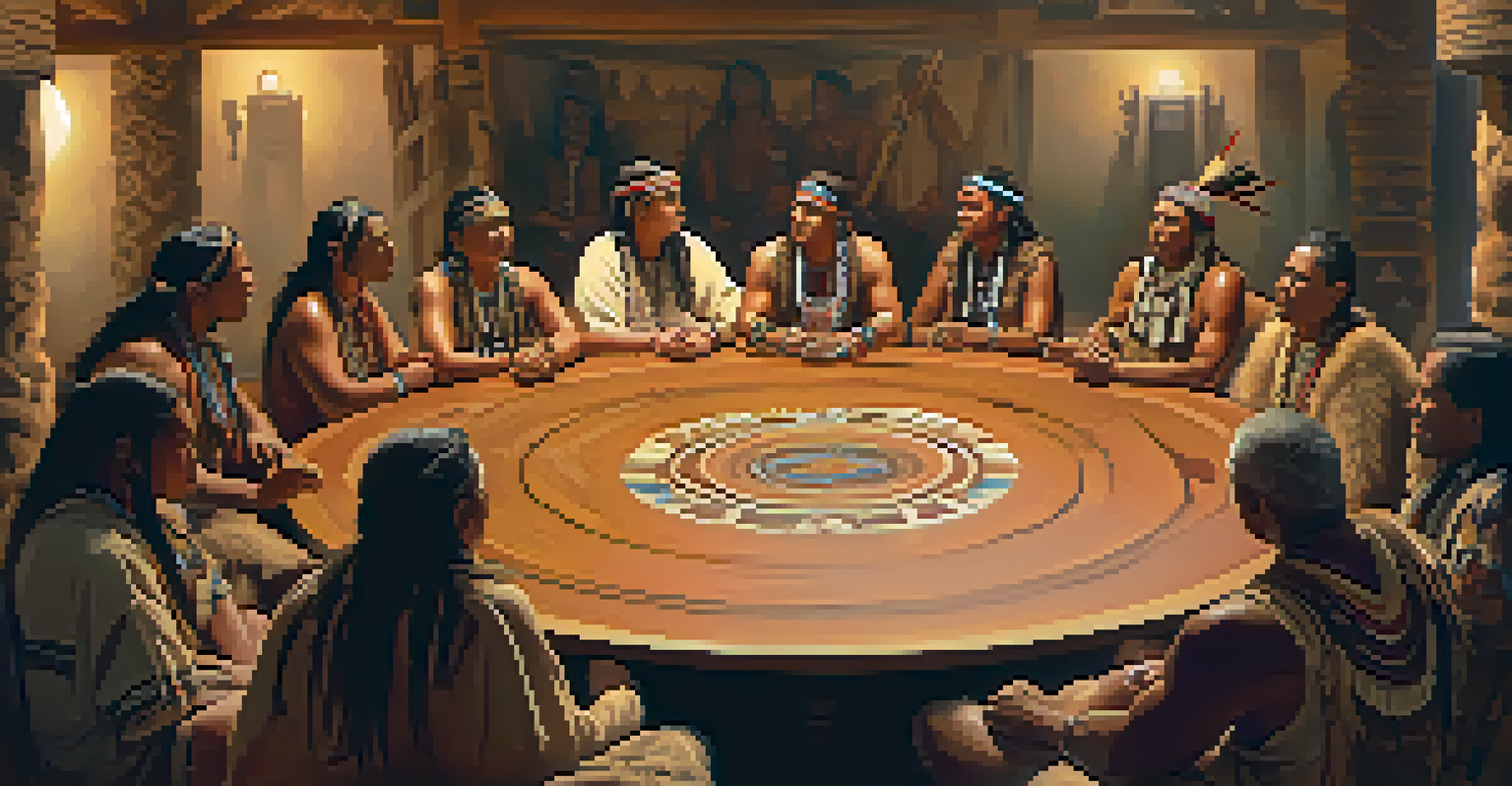The Role of Arizona Courts in Native American Sovereignty

Introduction to Native American Sovereignty
Native American sovereignty refers to the inherent authority of indigenous tribes to govern themselves within the boundaries of the United States. This concept is rooted in historical treaties and recognizes tribes as distinct political entities. Understanding this sovereignty is crucial, especially when examining the role of state and federal courts, which can influence tribal governance and rights.
Sovereignty is not just a legal status; it is a way of life for Native American tribes, reflecting their culture, traditions, and governance.
In Arizona, the unique relationship between state courts and Native American tribes plays a significant role in how sovereignty is exercised. The complexities arise from overlapping jurisdictions and varying interpretations of tribal laws. This relationship is pivotal as it can either enhance or challenge the autonomy of tribal nations.
To grasp the full scope of Native American sovereignty, one must also consider the historical context. The legacy of colonization and the establishment of reservations have shaped the current legal landscape. As we dive deeper into the role of Arizona courts, we will uncover how these dynamics play out in real-world scenarios.
Historical Context of Native American Sovereignty in Arizona
The history of Native American sovereignty in Arizona is intertwined with the state's own formation. The establishment of reservations and treaties set the stage for tribes to assert their rights and govern themselves. Key historical events, such as the Treaty of Guadalupe Hidalgo, have also influenced the legal framework concerning land and governance.

Arizona's courts have had to navigate this complex history, often making decisions that reflect both respect for tribal sovereignty and the authority of state laws. This balancing act can be challenging, leading to landmark cases that have shaped the understanding of tribal governance. Each decision can reverberate through tribal communities and impact their self-determination.
Understanding Tribal Sovereignty
Native American sovereignty is the inherent authority of tribes to govern themselves, shaped by historical treaties and legal interpretations.
As we examine specific cases, it becomes evident that the historical context is not just background information but a living part of the legal landscape. Understanding the past allows us to appreciate the ongoing struggles and triumphs of Native American tribes in asserting their sovereignty within the state.
Key Legal Cases Impacting Tribal Sovereignty
Several landmark legal cases have significantly impacted Native American sovereignty in Arizona. For instance, the case of *Arizona v. San Carlos Apache Tribe* addressed tribal water rights, highlighting the jurisdictional disputes between state and tribal authority. Such cases underscore the crucial role courts play in interpreting laws that affect tribal governance.
The relationship between tribes and states is a delicate dance that requires understanding, respect, and a commitment to coexistence.
Another important case, *United States v. Wheeler*, reinforced the concept of tribal sovereignty, affirming that tribes have the right to self-governance. These legal precedents are vital as they set the tone for how courts view tribal authority and the scope of their powers. Each ruling contributes to a broader understanding of the legal landscape surrounding Native American rights.
By analyzing these key cases, we see how the courts serve as battlegrounds for sovereignty issues. The outcomes of these cases not only affect legal precedents but also have profound implications for the day-to-day lives of indigenous people in Arizona.
The Intersection of State and Federal Law
In Arizona, the relationship between state and federal law creates a unique environment for Native American sovereignty. While tribes have inherent rights, these rights can be challenged by state laws and regulations. This intersection often leads to complex legal disputes, requiring careful navigation by both tribal leaders and legal authorities.
Federal law generally recognizes tribal sovereignty, but states may assert their own interests, leading to tensions. For example, state taxation rights on tribal lands have been a contentious issue, with courts needing to clarify the limits of both state and tribal authority. This ongoing tug-of-war illustrates the delicate balance that must be maintained.
Impact of Legal Decisions
Court rulings in Arizona significantly influence Native American communities, affecting their governance, economic opportunities, and cultural preservation.
Understanding this interplay is essential for anyone interested in Native American rights. It sheds light on the numerous challenges tribes face in asserting their sovereignty while dealing with external pressures from both state and federal entities.
Tribal Courts and Their Role
Tribal courts play a critical role in the legal framework of Native American sovereignty, often serving as the first line of justice for tribal citizens. These courts operate under tribal laws and customs, providing a unique perspective on justice that differs from state courts. They are essential in upholding the sovereignty of tribes and ensuring that community standards and values are respected.
While Arizona courts can influence tribal governance, tribal courts have the authority to adjudicate matters pertaining to their citizens. This dual system allows tribes to maintain their cultural practices and legal traditions. In many cases, tribal courts have proven to be more accessible and aligned with community needs than their state counterparts.
The relationship between tribal and state courts can be collaborative or contentious, depending on the circumstances. By understanding the role of tribal courts, we gain insight into how Native American sovereignty is lived and experienced on the ground.
Impacts on Native American Communities
The decisions made by Arizona courts can have profound impacts on Native American communities. Whether it’s about land use, resource management, or family law, court rulings often resonate throughout tribal nations. These decisions can shape economic opportunities, cultural preservation, and community welfare.
For instance, a ruling that recognizes tribal authority over natural resources can empower a community economically, allowing them to manage and benefit from their lands. Conversely, decisions that impose state regulations can undermine tribal governance and hinder their ability to self-determine. This continuous interplay between courts and communities emphasizes the stakes involved.
Future Challenges and Opportunities
The future of Native American sovereignty in Arizona presents both potential for collaboration with state authorities and ongoing legal challenges.
Ultimately, the effects of court decisions reach beyond legalities; they touch on the very identity and future of Native American tribes in Arizona. As we consider these impacts, it becomes clear that the courts are not just legal institutions, but pivotal players in the ongoing narrative of sovereignty.
Looking Ahead: The Future of Sovereignty in Arizona
The future of Native American sovereignty in Arizona is both promising and challenging. As societal attitudes shift and awareness grows, there is potential for more collaborative relationships between tribes and state authorities. However, legal challenges remain, particularly as new issues arise in a rapidly changing world.
Tribal leaders continue to advocate for recognition and respect of their sovereignty, often seeking to strengthen legal frameworks that support their rights. Additionally, the ongoing evolution of federal policies regarding Native American affairs will undoubtedly influence the dynamics of sovereignty in Arizona. This ever-changing landscape requires vigilance and proactive engagement from tribal nations.

As we look ahead, it’s essential to foster dialogue and understanding among all stakeholders. The pursuit of justice and equity for Native American tribes is a shared responsibility, and the courts will continue to play a critical role in shaping this future.